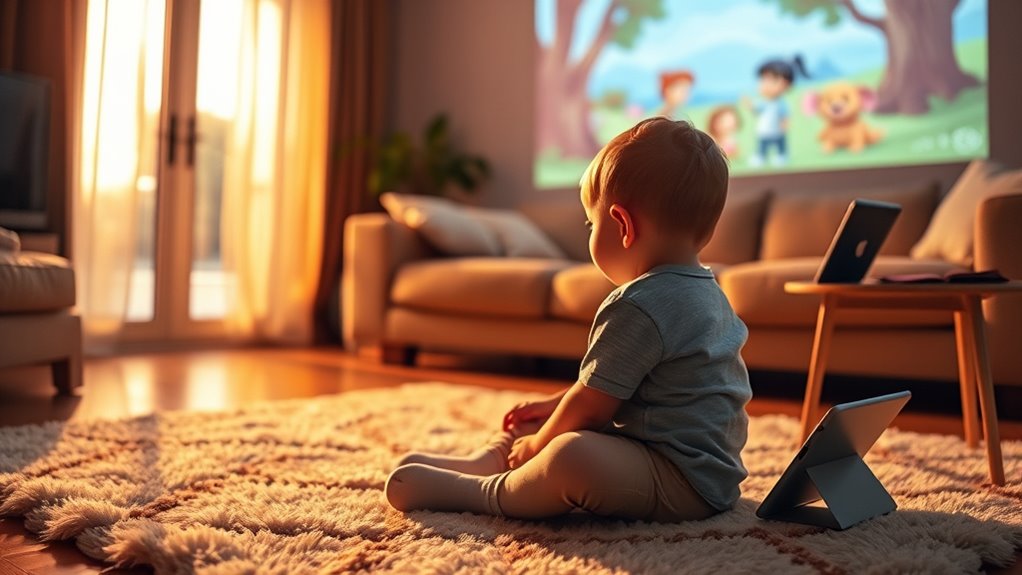In parenting, when you unconsciously project your fears, hopes, or past experiences onto your children, they become screens for your unresolved feelings. This can distort how you see and respond to them, impacting their development and your relationship. Recognizing this tendency helps you set healthy boundaries and see your child as a unique individual. If you explore further, you’ll discover ways to foster more mindful, empathetic interactions that benefit both of you.
Key Takeaways
- Parents may project their unresolved feelings onto children, seeing them as mirrors of their own emotions or issues.
- Viewing children as “screens” reflects how parents unconsciously overlay personal fears, hopes, or insecurities onto them.
- Projection can distort perceptions, causing parents to interpret children’s behaviors through biased or inaccurate lenses.
- Recognizing projection helps parents see children as individuals, not as reflections of their own unresolved emotional states.
- Cultivating emotional awareness and boundaries reduces projection, promoting healthier, more authentic parent-child relationships.

Have you ever wondered how your own feelings and experiences influence the way you parent? It’s a common question, and understanding the answer requires developing emotional awareness. When you’re aware of your emotions, you’re better equipped to recognize how they shape your reactions and interactions with your child. Often, unresolved feelings or past experiences can lead you to project your own fears, hopes, or insecurities onto your children. This projection can blur the boundaries between your feelings and theirs, making it challenging to see your child as a separate individual with their own needs and emotions. Maintaining clear parent-child boundaries is essential here; it helps you hold space for your child’s unique experiences without overlaying your inner world onto theirs.
Your emotional awareness acts like a mirror that reflects what’s going on inside you. When you notice feelings like frustration, guilt, or anxiety, you gain insight into your internal landscape. This awareness allows you to pause before reacting, giving you a chance to choose responses rooted in empathy rather than projection. For example, if you’re feeling overwhelmed, you might unconsciously expect your child to behave perfectly or to respond in a way that relieves your stress. Recognizing this tendency helps you separate your feelings from theirs, preventing you from imposing your emotional baggage onto your child’s experience. Instead, you can approach their behavior with curiosity and understanding, respecting their individuality. Developing emotional regulation skills further supports this process by helping you manage your reactions more effectively.
Creating healthy parent-child boundaries is vital because it establishes a clear line between your emotional world and your child’s. Boundaries aren’t about controlling your child but about respecting their autonomy and emotional space. When you’re aware of your own emotional triggers, you can avoid crossing those boundaries by reacting defensively or overly emotionally. Instead, you can focus on listening and supporting your child’s feelings without overlaying your own narratives onto theirs. This practice nurtures trust and helps your child develop their own emotional awareness, too. They learn to recognize and manage their feelings without feeling judged or misunderstood.
In essence, being emotionally aware and maintaining strong boundaries transforms your parenting approach. It enables you to see your child clearly, free from the distortions of projection. You become more mindful of your reactions and more respectful of your child’s individuality. This not only fosters healthier parent-child relationships but also teaches your child how to develop emotional awareness themselves. When you parent with clarity and emotional integrity, you create a safe space where your child can grow into a self-aware, confident individual, unburdened by your unresolved feelings or projections.
Frequently Asked Questions
How Can Parents Recognize Their Own Projections Onto Children?
You can recognize your projections by practicing parent self-awareness and noticing when your emotional triggers arise. Ask yourself if your reactions are based on your own past experiences or unresolved feelings. When you feel anger, frustration, or guilt, pause and reflect on whether you’re attributing these emotions to your child. Being honest with yourself helps you identify projection and respond more thoughtfully, fostering healthier parent-child relationships.
What Are the Long-Term Effects of Projection on Child Development?
When you lack projection awareness and emotional boundaries, it can negatively impact your child’s development over time. They may struggle with self-identity, trust, or emotional regulation because they absorb your unresolved feelings and expectations. This can lead to dependency or confusion about their own feelings. To foster healthy growth, stay mindful of your projections and set clear emotional boundaries, helping your child develop confidence and autonomy.
Are There Specific Signs Indicating a Parent Is Projecting?
You might notice signs of projection when your parental biases influence your reactions, causing you to see your child through your own emotional triggers. If you frequently interpret your child’s behavior as reflecting your unresolved issues or project your fears onto them, it indicates projection. Pay attention to your feelings during interactions—if you often feel misunderstood or overly defensive, it may be a sign you’re projecting your own worries onto your child.
How Can Parents Effectively Reduce Projecting Behaviors?
To reduce projecting behaviors, you should focus on strengthening emotional boundaries and practicing self-awareness exercises. Set clear limits on what you share and how you respond to your child’s actions. Regularly reflect on your feelings and motivations to recognize when you’re projecting. By staying mindful and maintaining healthy boundaries, you can prevent your emotions from influencing your child’s development and foster a more supportive, balanced relationship.
Can Projection Influence a Child’s Self-Esteem and Confidence?
Think of your child’s self-esteem as a delicate mirror. When you project your emotions and insecurities onto them, it’s like an emotional reflection that distorts their self-image. This process, known as identity transfer, can shake their confidence and skew their perception of themselves. By being mindful and practicing emotional reflection, you help preserve their authentic self, fostering a healthy sense of identity and resilience instead of unwarranted self-doubt.
Conclusion
Understanding projection in parenting is like holding a mirror to your own reflections. When you recognize your hidden fears and expectations, you clear the fog, allowing your child’s true self to shine through. By being mindful, you prevent your biases from casting shadows on their growth. Remember, your reactions are like the lens through which your child sees the world—clearer reflections lead to healthier connections. Embrace awareness, and watch your relationship blossom like a well-tended garden.









